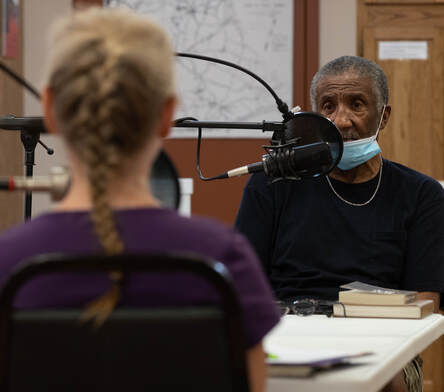The Conversation Continues
 Jim Bannister, during our “family conversation” at the Hopewell Museum in Paris, Ky., July 15, 2020. Photo by Bobby Shiflet. When he walked into the meeting room, my knees nearly buckled.
Jim Bannister, during our “family conversation” at the Hopewell Museum in Paris, Ky., July 15, 2020. Photo by Bobby Shiflet. When he walked into the meeting room, my knees nearly buckled.Long and lanky, Jim Bannister physically resembles his great-uncle, George Carter. From the way Bannister heard his grandmother describe her brother, it seems the two men also share some character traits. Both are genial and gracious, polite and respectful. (Quite a contrast from how Carter was portrayed in newspaper articles justifying his fate.) I don’t know whether Carter also shared Bannister’s gentle garrulity or his bracing honesty.
Bannister has lived a long and full life. After retiring from one of our nation’s iconic companies, he stumbled into a second career that filled his next 15 years. He is immensely proud of his three children, five grandchildren, and two great-grandchildren.
George Carter never had a chance to see what he could make of his life. At 22, he was murdered by a mob seeking misplaced justice for my great-grandmother. He never got to see his two daughters—an infant and a toddler when he died—grow into young women.
Although I have no evidence that my family was directly involved in that mob, the actions of those men must have had my great-grandparents’ tacit approval. The long, detailed, nearly baroque newspaper article that described the event never mentioned that Mrs. Board was outraged by this rogue justice. If that had been the case, I have to imagine the newspaper’s owner—the husband of her good friend—would have felt obligated to acknowledge it. Or at least allude that the mob’s actions were shocking to her “gentle sensibilities.” Instead, the editor felt comfortable printing her name in bold type just below the booming headline “JUDGE LYNCH.”
And it was this silent acceptance that made it all so sinister. That same unspoken code underpins the racism that roils us today. It informs our wordless interpretation of the symbols of our bloody history: the monument that looms over a city, the flag draped along a front porch, the arched gate that tells a tale that only a few people can hear.
My ancestors helped gird this “infrastructure of oppression” that former President Obama referenced during his eulogy for Congressman John Lewis, a national hero who dedicated his life to shouting out loud what some would prefer to keep under a bushel. Who demanded that we unshackle ourselves from the myths and the lies we have told ourselves and exclaim that all men are indeed equal and therefore deserve an equal chance at a long and full life.
I’m still trying to understand why Jim Bannister was willing to meet with me, a member of the family that introduced such horror into his own. I think, in part, he was determined to break the silence that surrounded this piece of his family’s history. A silence that he bravely mimicked at a very young age when he chose not to tell his grandmother about the beatings he endured at the hands of a black teacher. It was the oppressiveness of all that silence that burdened him. Why would no one talk about it? Why could he not learn more about an incident so significant to his beloved grandmother?
Going into our initial meeting, I mistakenly thought that George Carter was Jim Bannister’s great-great-uncle. That seemed fairly removed from his own life. But my heart began racing when I realized early in our conversation that we were talking about his grandmother’s brother. The grandmother who had raised him. A woman he was around every day. George Carter would have been immediate family to him.
I, on the other hand, had never known my grandfather, the one who allegedly identified George Carter at the jail when he was only eight years old. My mother had never known him. It all feels like distant history for me.
But with Jim Bannister’s help, I will be able to feel a little more sharply the pain my family caused. That’s what I need to propel me to search for another small step I can take to help right some of these generational wrongs, to heed John Lewis’ words in his final op-ed:
“Democracy is not a state. It is an act, and each generation must do its part to help build what we called the Beloved Community, a nation and world society at peace with itself.”
I recently called Mr. Bannister, breaking another brief silence that hung between us, to let him know that I had discovered we had both worked for the same company. To let him know there was something else we had in common. We had a long and delightful conversation. He shared more about growing up in Paris just after World War II, as well as a few tidbits about his children’s and grandchildren’s accomplishments. When I got off the phone, I was grinning from ear to ear. I have a new friend. And I couldn’t be happier. Read coverage of the conversation in the Lexington Herald-Leader [July 30, 2020]Listen to the full conversation [July 15, 2020]Listen to the segment aired on WEKU’s Eastern Standard program [July 30, 2020]—also available as a podcast on iTunes, Stitcher, Google Play, and NPR One.
Published on August 02, 2020 11:15
No comments have been added yet.



